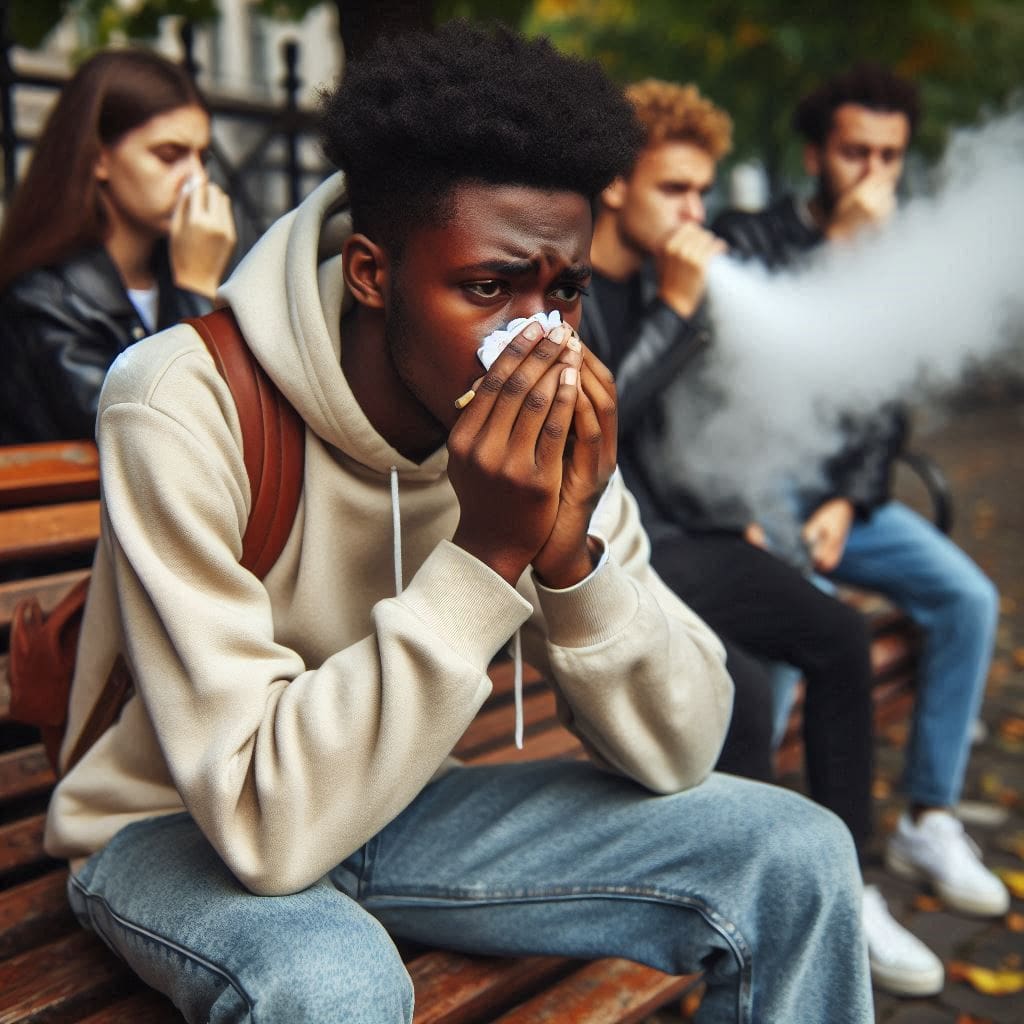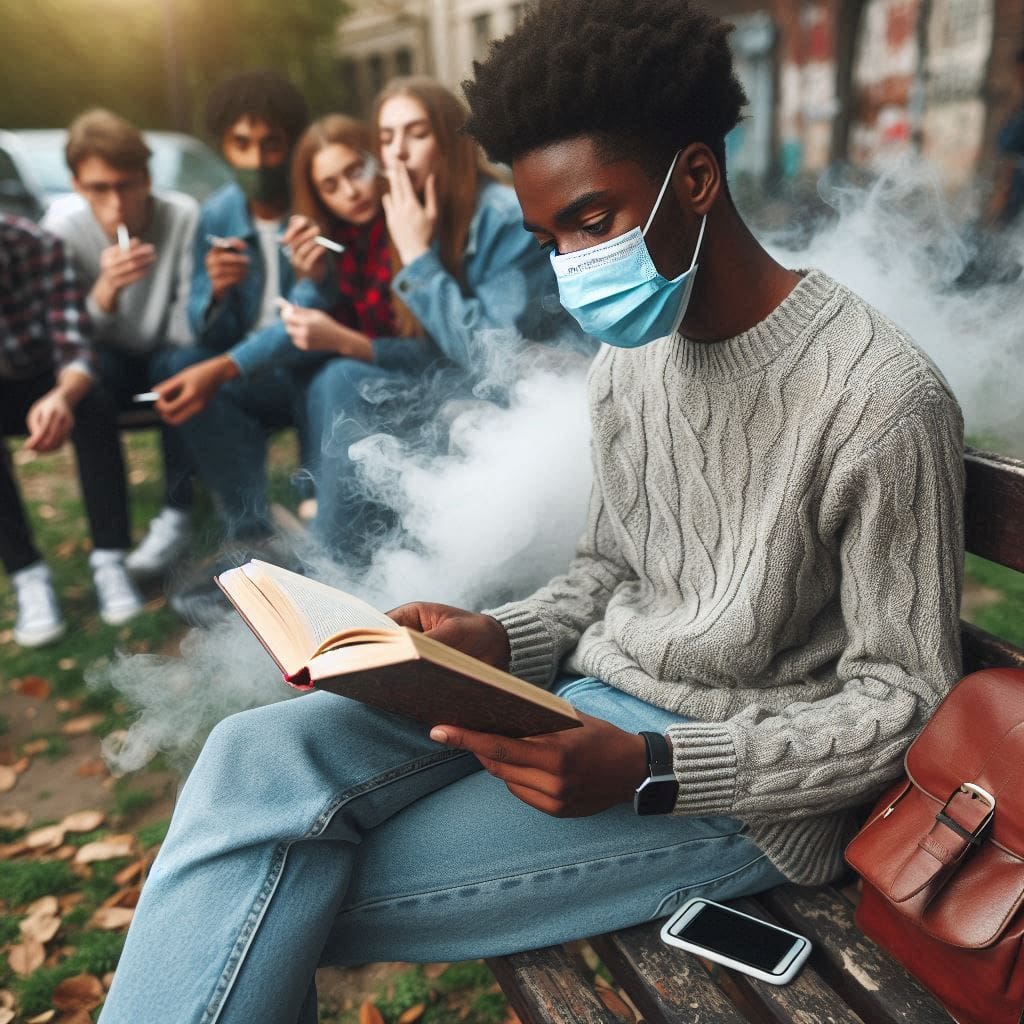
Secondhand smoke, also called passive or involuntary smoke, is the breathing in of smoke from cigarettes, cigars, or pipes by someone who isn’t smoking themselves. It’s like inhaling harmful chemicals without even picking up a cigarette.
Who is a Secondhand Smoker?
A secondhand smoker is someone who breathes in this smoke. It can be anyone, including family members, friends, co-workers, or even strangers in public places.
Anyone who breathes in air containing secondhand smoke is a secondhand smoker. This includes:
- Children living with parents who smoke
- Spouses or partners of smokers
- People working in environments where smoking is allowed
- Bystanders in public places where smoking occurs
The Dangers of Secondhand Smoke
Exposure to this involuntary smoke can lead to a variety of health problems for: Children, pregnant women, and people with preexisting health conditions like asthma or heart disease are especially vulnerable.
Here are some key health risks associated with secondhand smoke:
- Respiratory Problems: Breathing in secondhand smoke can cause asthma attacks, bronchitis, and pneumonia. It can also lead to chronic obstructive pulmonary disease (COPD).
- Heart Disease: Even brief exposure to secondhand smoke can damage the lining of blood vessels, leading to an increased risk of heart attacks and stroke.
- Cancer: Secondhand smoke contains more than 70 cancer-causing chemicals. It can lead to lung cancer and increase the risk of cancers of the throat, bladder, and nasal cavities.
- Harm to Children: Children exposed to passive smoke are more likely to suffer from sudden infant death syndrome (SIDS), low birth weight, ear infections, and severe asthma attacks.
- Pregnancy Complications: Pregnant women exposed to passive smoke are at a higher risk of miscarriage, stillbirth, premature birth, and having babies with low birth weight.
- Ear infections: Children exposed to this involuntary smoke are more likely to get ear infections.
Secondhand Smoke: Hurting Your Mood and Mind Too
We know secondhand smoke harms your lungs, but it can also mess with your mood and overall well-being. Here’s how:
- Feeling Down: Studies suggest secondhand smoke exposure might be linked to depression and anxiety, especially in teens.
- Stressful Situations: Passive smoke can make you feel more stressed and on edge.
- Trouble Sleeping: The irritation from passive smoke can disrupt sleep, leaving you tired and grumpy.
- Lower Energy: Passive smoke might zap your energy levels, making it harder to focus and get things done.
- Secondhand Smoke, Secondhand Sadness: Living with someone who smokes can be a source of frustration and tension, affecting your overall mood.
By avoiding this involuntary smoke, you’re safeguarding your physical and mental health. It’s a win-win for your entire well-being!
Secondhand Smoke: Can It Hurt Your Relationships? You Bet!

Secondhand smoke isn’t just bad for your lungs and overall health, it can also put a strain on your relationships
Here’s how it can affect your relationship life:
- Smoke Smell: Let’s face it, cigarette smoke leaves a lingering odor on clothes, hair, and furniture. This can be unpleasant for non-smoking partners or friends.
- Health Concerns: If you care about someone who smokes, you might constantly worry about their health risks from smoking. This worry can create tension.
- Arguments and Disagreements: Disagreements can arise over smoking habits. Smokers might feel restricted, while non-smokers might feel unheard about their health concerns.
- Social Outings: Smoke-free policies in restaurants and other places can limit where you can go together for fun, impacting shared experiences.
- Kissing and Cuddling: The smell and taste of cigarettes can make intimacy less enjoyable for non-smokers.
- Financial Strain: Smoking can be expensive, causing financial arguments and disagreements about spending habits.
- Living Arrangements: Deciding where and when smoking is allowed in a shared living space can be a constant source of friction.
- Family Matters: Passive smoke exposure can be especially damaging for children living with smokers. This can create stress and conflict within the family.
By openly communicating and finding solutions (like designated smoking areas or quitting support), you can minimize the negative impact of passive smoke on your relationships.
The Overall Impact on Well-being
Living with a smoker or spending time in smoke-filled environments can affect your overall well-being. It can lead to chronic health issues, increased medical costs, and a lower quality of life. Avoiding secondhand smoke is crucial for maintaining good health.
Can a Mask Block Secondhand Smoke? Here’s the Simple Truth

Protecting yourself from secondhand smoke offers a wealth of advantages.
- Regular Masks (like the blue ones): These won’t do much against secondhand smoke. They might block some bigger stuff, but they’re loose-fitting and let smaller, harmful particles through.
- N95 Masks: These offer way better protection! They fit snug around your nose and mouth and can filter out at least 95% of tiny particles in the air, including many of the bad things in secondhand smoke.
Remember: Even N95 masks might not block everything, especially if they’re not on super tight. The best way to stay safe is to avoid passive smoke completely.
How to Protect Yourself and Others
The best way to protect yourself from secondhand smoke is to avoid it altogether. Here are some tips:
- Create Smoke-Free Spaces: Make your home and car smoke-free zones. Encourage others to smoke outside and away from non-smokers.
- Advocate for Smoke-Free Policies: Support laws and regulations that ban smoking in public places, including workplaces, restaurants, and parks.
- Educate Others: Spread awareness about the dangers of secondhand smoke and encourage smokers to quit.
- Choose smoke-free environments: When going out, choose restaurants, bars, and other establishments that have smoke-free policies.
- Talk to your doctor: If you’re concerned about passive smoke exposure, talk to your doctor about ways to protect yourself and your family.
- Seek Help: If you are a smoker, consider quitting. There are many resources available to help you, including counseling, nicotine replacement therapies, and support groups.
Conclusion
Secondhand smoke is a serious health hazard. By understanding its risks and taking steps to avoid exposure, you can protect yourself and your loved ones. Making informed choices and promoting smoke-free environments can lead to a healthier and happier life for everyone.



